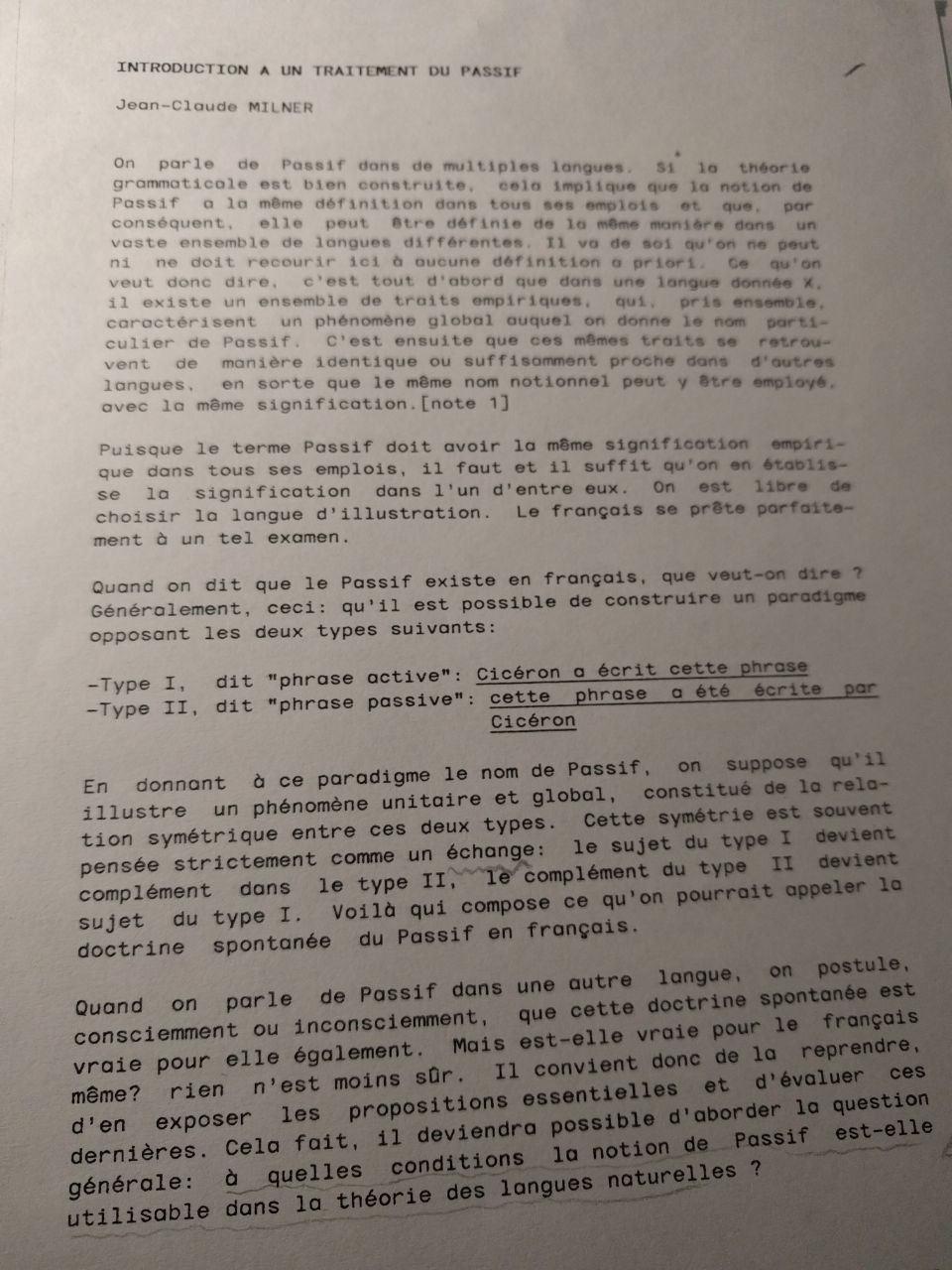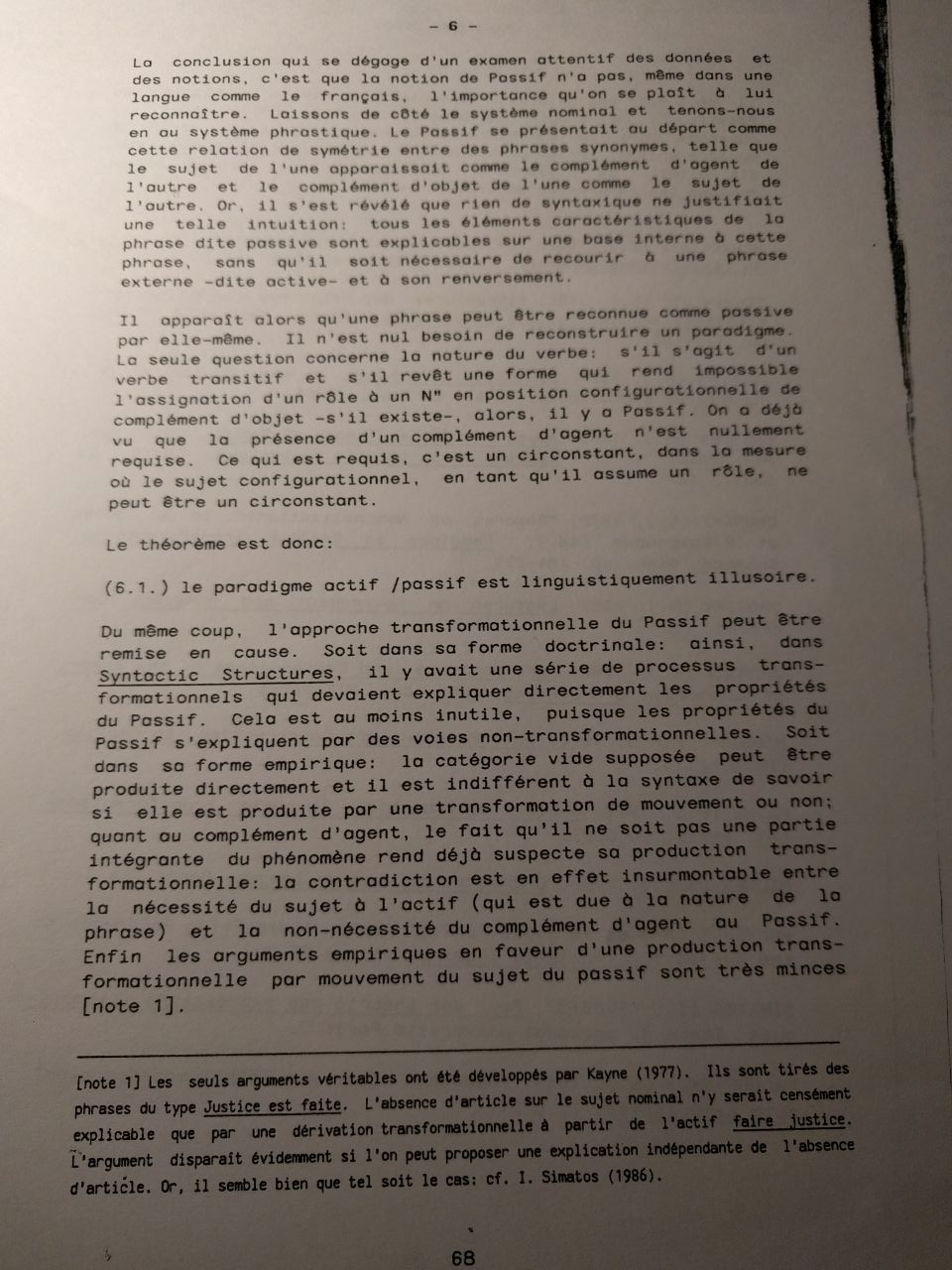I've recently read a book written by J.C Milner, in French, entitled 'introduction a un traitement du passif' (1986), he was influenced by Generative theory and some of his basic assumptions regarding the passive correspond to Chomsky's 'syntactic structures' and 'remarks on nominalization'. However, in this book, Milner comes to the conclusion that the 'passive' is an illusion and/or its paradigm doesn't exist. I still don't see what his conclusion is aiming at. Why considering passive illusory?
-
5What's called "passive" differs in every language, just like what's called "/e/" differs in every language -- and may not appear at all in some languages. English and French and most Indo-European languages have passive constructions or paradigms, and similar phenomena are common. But there are languages with no passives, or several passives (English has the Be Passive and the Get Passive, for instance -- He was arrested and He got arrested don't mean quite the same), because "passive" is a grammatical term, invented by grammarians, and not a Law Of Nature.– jlawlerCommented Oct 17, 2017 at 13:54
-
2Thank you. Still, I don't see his use of the word 'illusion'.. The problem of the passive as he pictures the construction is that Active/Passive paradigm, however the transformation, they possess some kind of synonymy with different syntax.. Milner (1986), and as I keep reading more, Galand (1979), are saying the same, in the context of French linguistics. I'm aware of the fact that French has passive, morphological and non-morphological, but his use of the word 'illusion' is more related to 'theory' 'methodology' 'conceptual grounds', it has nothing to do with empirical data.– TsutsuCommented Oct 17, 2017 at 16:39
-
I think you need to provide a little more detail (I can't find the book online or in my uni's library, so it may not be very common). Is he talking about sentences like 'Les pommes se vendent bien', 'les pommes sont vendues', or 'on a vendu les pommes'? What is his definition of the passive? etc. Each author has a different definition of the passive and it's probably through his own (possibly idiosyncratic) definition that he considers the passive nonexistent in French...– WavesWashSandsCommented Oct 20, 2017 at 9:57
-
The book isn't available online. I borrowed it from a library and they agreed to photocopy it. I don't have a scanned copy as well. This is his statement on page 68, <6.1.> 'Le paradigme actif/passif est linguistiquement illusoire'. I don't know how to upload images in my comments, otherwise I would have uploaded some to show you the examples he used. If you could show me, I will upload some images. thanks.– TsutsuCommented Oct 20, 2017 at 11:13
2 Answers
I think he is using 'passive' to mean 'the passive transformation', probably because this was the most common meaning of 'passive' at the time. He's arguing that we can generate and interpret passive sentences directly without using transformations, and that the difference between passive and active is that in the passive, the verb cannot take an object. I suspect he would not disagree that the word 'passive' is still useful for talking about the sentence structure; it's just that he does not agree with treating it as a transformation from the active.
The reason why he takes opposing the passive transformation to be the same as opposing the passive is apparently because he believes that transformational grammar serves as a universal metalanguage for describing natural language syntax, and linguistic concepts should be defined in terms of this universal metalanguage. Since the passive does not exist in this metalanguage, it does not exist at all.
-
Your analysis is very reasonable in nature. In addition to what you said, I was also thinking about the passive not as a primitive operation dealt with in syntax, as was the view before, it's now a construction that involves different operations like movement, subject demotion (dethematization), and specific morphology related to it. thank you.– TsutsuCommented Oct 20, 2017 at 15:25
-
It's quite confusing since 'illusion' has opposite consequences when applied to the transformation versus the lexicon. It is likely that passives are stored as passives, not converted to actives; but that doesn't require doubling the lexicon -- there may be a passive 'bit' on each stored event that chooses between active and passive senses of a single verb definition (although irregular verbs hint that active and passive definitions may once have been stored separately).– amICommented Oct 20, 2017 at 21:43
A passive serves the function of promoting a direct object to subject.
In English, the main focus is on the agent most of the time (an agent is the person/thing that does something in a sentence). This helps in what is called 'pivotting', where two sentences are assumed to have the same subject.
i.e: Bob bought groceries, then went home.
We don't need to restate the subject in the second clause, thanks to pivotting. However, what if the agent of the first sentence is the direct object of the next sentence (or vice-versa)? A passive allows this to happen.
i.e: The cat run up a tree because it was being chased.
As the second example demonstrates, using a passive also allows you to drop the agent. This can also be used to improvise an anti-causative, which is a construction where something happens to something with no apparent cause.
Not all languages have passives. But not all languages have nominative alignment. Ergative languages for example typically have an anti-passive instead. This is because in ergative languages, the direct object is more focused on than the agent. In fact, you can determine which alignment a language has by simply telling a person who speaks the language this:
Bob hit bill, then ran.
Then you ask them: Who ran away?
If they answer 'Bob', then the language is nominative. But if they speak an ergative language, they will assume its bill, because that's how their language works. Sentences pivot around the direct object rather than the agent most of the time. If they wanted to specify that Bob was the one who ran away, they would have to use an anti-passive construction in the second clause. English being a nominative language, we don't need to do such. However, we have the reverse problem in that if the direct object of the first sentence is the agent/subject of the next sentence, then we have to use a passive construction in the first sentence. Neither really has an advantage over the other, in fact languages are almost as likely to be ergative as nominative. It should be noted though that there's other alignments besides these two. And one language family uses an alignment system unique to that family (its called Austronesian alignment, named after the language family of course).
Of course some languages just don't bother with either a passive or anti-passive. For example, Basque, which is an ergative language, doesn't have an anti-passive, or pivotting in general. Speakers claim that their language doesn't really have a concept of a subject. They do have agents and direct objects, but they don't ever emphasize one over the other.
And it should be noted that generative linguistics is an out-dated theory that mostly only fans of Chomsky really pay attention to. If you want to see why, read up on L1 acquisition (the study of how kids pick up their first language). It pretty clearly disproves generative linguistics. Children for example don't realize that they can transform statements into questions or vice-versa. In fact, they tend to learn to ask questions first before statements. Which makes sense. They don't know enough at first to give an answer to anything, they're still learning about the world. So of course questions come before statements.
-
I don't understand how this answers the question. Have you read Milner, or are you saying his book can be dismissed without reading it because it was based partly on generativism? In any case, the question asked if the passive is an illusion (presumably in languages that are typically said to have a "passive voice"). It didn't ask about different kinds of alignment, or anti-passives, or languages that everyone agrees don't have a passive. Would you say that the passive is an illusion, or not? Commented Oct 19, 2017 at 17:11
-
I thought that answered the question? The passive does serve a purpose, and can result in a change of meaning in some cases. For instance, you can say that 'the book was lost', even if you don't know the circumstances of it being lost. Like, if a book was in a library somewhere and no one could find it when they looked for it years later, who technically lost it? The passive does serve a purpose and can result in a change of meaning. Therefore, its not 'illusionary'.– user19661Commented Oct 19, 2017 at 21:17
-
I was trying to comment, and something went wrong, I may have deleted something, I apologize, I'm new here and not used to technicalities. My comment simply was about Milner again since he considers active/passive paradigm having 'synonymy' (identical meaning), with different syntax, this paradigm is paradoxical, or contradictory in a theory of language like syntax. So, Milner concluded in this book that since active/passive paradigm has this nature, and attempts of any linguistic theory would be contradictory or paradoxical, then PASSIVE/ACTIVE paradigm is ILLUSORY (doesn't exist)..– TsutsuCommented Oct 20, 2017 at 10:07
-
1Morphologically ergative languages don't have to be syntactically ergative though - it's just that Dyirbal is a classic example of ergativity and has an absolutive pivot. ;) Commented Oct 20, 2017 at 10:17

